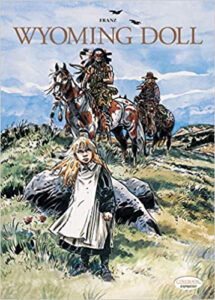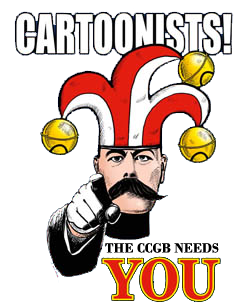By Franz
Publisher: Cinebook
ISBN: 9781849184502
To date, the Expresso label on a Cinebook title has been a guarantee of quality, and that’s no less the case here with Wyoming Doll.
Set in the Wild West, the story begins with settlers crossing the vast expanse of open country, only to come a cropper when aggressive Native Americans attack the group. Almost all of the settlers die in the attack. The survivors are a young man, Logan, who was sent ahead to scout, and two young girls, abducted by the warriors. When Logan finally has the courage to return to the carnage he finds one of the settlers, grandfather to one of the abducted girls, badly wounded, but alive. Also amongst the detritus are the savings from each slaughtered family. For Logan, it is a matter of honour to find the girls and return their respective family’s money.
But this isn’t just a tale from one nobly intentioned white male youth. The warriors that attacked the wagon train aren’t the only tribe on the prairie. A young warrior from the Sioux, spurned and hot-headed, abandons his people with the intention to wreak havoc amongst the encroaching white presence. Stumbling across the rival tribe he finds the blonde-headed young Irish girl and rescues her. with nobody to hand her over to, his impulse becomes his calling. She is silent and placid, seemingly unreachable across the language barrier, but he persists. It’s now inevitable that their path will cross with Logan’s.
From a storytelling perspective, the book works incredibly well. Characters are a blend of aspirations and faults that have shaped, and continue to shape, their lives. Actions have consequences, and for every good deed done there’s someone looking to rob, murder, or take advantage. Nor do the heroic actions guarantee a happy ending either (not to say that it’s tragic either). It’s a befitting ending, and one that feels in keeping with the hand dealt to people who have chosen to live on the frontier.
Artistically, the book is just beautiful. Detailed, with a watercolour finish, it perfectly encapsulates the period. A really wonderful thing to behold, and a real shame that, as the book mentions at the beginning, Franz has since died. I’d have loved to have seen more like this but, fortunately, there does appear to be plenty of work prior to this one to discover. My only complaint would be that the reproduction in the Expresso format is perhaps too small to do the pages their full justice.
All told, though, this is a great book. Its perspective is engaging, its journey is intriguing, and its outcome satisfying yet surprising.
And if you liked that: For more Cinebook Expresso Old West-themed reading, get yourself a copy of Rosinski and Van Hamme’s Western


No comments yet.